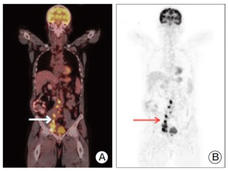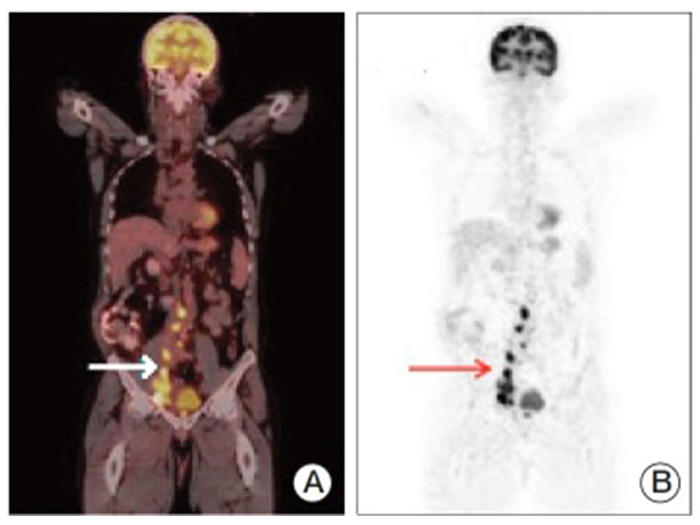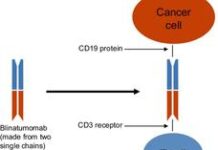, by NCI Staff
For most people with advanced bladder cancer, starting immunotherapy shortly after initial treatment with chemotherapy is better than taking an extended break from cancer treatment, according to results from a new study.
In the study, people who received the immunotherapy drug avelumab (Bavencio) before any sign of cancer recurrence lived substantially longer than people who received supportive care alone until their cancer returned.
The findings were reported May 31 at the 2020 American Society of Clinical Oncology Virtual Scientific Program.
Patients who received avelumab as maintenance therapy had “the longest overall survival ever documented” in a clinical trial for patients with metastatic bladder cancer, said Elizabeth Plimack, M.D., head of bladder cancer research at Fox Chase Cancer Center, who was not involved with the study, speaking at the ASCO meeting.
“It’s great to see positive results” in a clinical trial for bladder cancer, said Andrea Apolo, M.D., head of the Bladder Cancer Section at NCI’s Center for Cancer Research. However, she cautioned, some uncertainties remain about the best order of treatments for people with advanced bladder cancer.
Rapid Recurrence
People with bladder cancer that has spread to other parts of the body (metastasized) have a poor prognosis, with only about 5% living for 5 years after diagnosis. Although most bladder cancers stop growing, shrink, or even disappear in response to chemotherapy that uses a platinum-based drug (such as cisplatin), the cancer almost always returns rapidly, sometimes within just a few weeks or months, and grows aggressively.
Since 2016, the Food and Drug Administration has approved five different immunotherapy drugs for the treatment of metastatic bladder cancer. These therapies all belong to a class of drugs called immune checkpoint inhibitors. Checkpoint inhibitors bind to proteins that can keep cancer cells from being killed by the body’s immune cells. This can free immune cells to attack cancer cells throughout the body.
Several of these drugs were approved as initial therapies (first-line therapy) for some people with advanced bladder cancer who, for various health reasons, cannot receive platinum-based chemotherapy. Other approvals were for bladder cancer that recurs after platinum-based chemotherapy (second-line therapy).
But the aggressive nature of bladder cancer when it recurs means that many people never have the opportunity to receive immunotherapy—or any other second-line therapy, explained Thomas Powles, M.D., of the CRUK Barts Cancer Centre in London, who led the new study and presented the results at the ASCO meeting.
“After first-line chemotherapy, only a minority of patients get second-line treatment. And outcomes with second-line treatment are poor, because the disease is aggressive and grows rapidly,” said Dr. Powles.
Patients are left in what can feel like a no-win situation, explained Arjun Balar, M.D., director of Genitourinary Medical Oncology at NYU Langone Health’s Perlmutter Cancer Center, who was not involved with the study. Platinum-based chemotherapy can be grueling, he continued, and “these patients have had four to six cycles of treatment, and they’re pretty beat up. They want a break [from treatment].”
So, researchers wanted to see whether moving more quickly to using a checkpoint inhibitor could not only forestall the disease’s return but also be tolerable to patients.
Substantial Improvement in Survival
Dr. Powles and his colleagues enrolled 700 people with locally advanced or metastatic bladder cancer in the international JAVELIN Bladder 100 study.
All participants had already received chemotherapy—with either cisplatin and gemcitabine (Gemzar) or carboplatin and gemcitabine, if their health did not allow them to receive cisplatin—and their disease had not worsened during chemotherapy.
Participants were then randomly assigned to receive either maintenance treatment with avelumab plus supportive care or supportive care alone. People in the maintenance group received infusions of avelumab every 2 weeks until their cancer started growing again or they left the study for other reasons. Supportive care for both groups included pain management, nutritional support, and treatment of infections.
People in the supportive care group whose cancer got worse did not receive avelumab as part of the trial. However, they could receive it or any other immunotherapy drug after leaving the study.
Maintenance treatment with avelumab after chemotherapy turned out to have substantial benefits. The median overall survival for people who received maintenance avelumab was more than 21 months, compared with about 14 months for people who received only supportive care until their cancer got worse.
This improvement in survival was seen whether or not participants’ tumors had high levels of a protein called PD-L1, which is the target of avelumab. PD-L1 levels have been widely studied as a predictor of response to treatment with checkpoint inhibitors.
About 47% of people in the avelumab group and 25% of people in the supportive care group experienced serious side effects thought to be related to treatment. The most common serious side effects in the avelumab group included urinary tract infections, anemia, and fatigue.
Twelve percent of people who received avelumab had side effects that caused them to stop treatment. Two deaths during the study—one from sepsis and one from stroke—were determined to be due to the drug.
Subtleties and Future Questions
Several factors have to be carefully considered in interpreting the trial results, explained Dr. Apolo.
A major one is that the study did not directly compare survival between people who got avelumab immediately versus when their cancer progressed. Only about half of the participants who initially received supportive care alone went on to receive immunotherapy after their cancer got worse. There could be many reasons for this, including lack of access to these drugs in different countries, Dr. Apolo said.
But it also might be that, for some people, the cancer was progressing too rapidly, she added. “When these tumors start growing, they start growing very quickly. So if you wait to start [immunotherapy] at the time of progression, maybe it’s too late,” added Dr. Apolo.
“Not all patients will be caught by the second-line [therapy] safety net,” agreed Dr. Plimack.
So, for now, said Dr. Balar, the takeaway message from the JAVELIN study is “after chemotherapy, don’t wait to give immunotherapy.”
But more and more, studies are looking at whether some patients should receive immunotherapy as first-line treatment, he continued. “Immunotherapy is one of the most important advances we’ve made in the last 30 years,” Dr. Balar said.
The JAVELIN results can’t provide any insight into which patients benefit from first-line treatment with a platinum-based chemotherapy, he added. “This trial wasn’t designed to ask: Is chemotherapy necessarily the best choice for every patient?” he explained.
And some patients who receive immunotherapy for bladder cancer have remissions that last for years, he continued. “So, we need to figure out: What’s the best way to introduce that treatment to patients at some point in their cancer care?”
Ongoing studies will help answer those questions, while others are studying whether immunotherapy should be given to people with bladder cancer that has not yet metastasized, said Dr. Apolo.
“I’m thrilled that so much time and effort is being dedicated to this tumor,” she said. “There were so many years when nobody was interested in doing [studies] in bladder cancer, because nothing worked. Now that we have immunotherapy that works, we’re building on that so we can improve survival for patients.”











